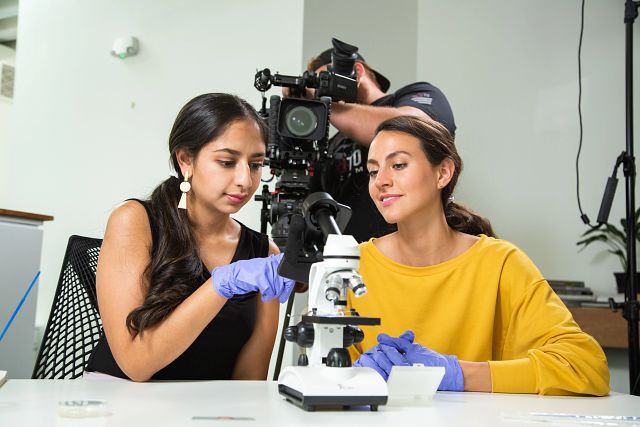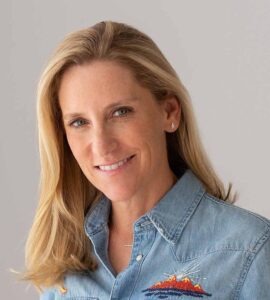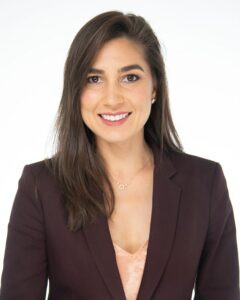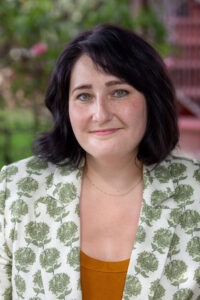There was an episode featuring a USA National Swim Team member who redirected her skills into becoming an underwater engineer. Another spotlighted a dancer-turned-technnologist who taught robots how to boogie. Another focused on young cheerleaders from Florida who demonstrated the laws of physics with their athleticism.
Welcome to science, “Mission Unstoppable” style – it’s the show that’s transforming how we see STEM careers for girls.

Produced by Lyda Hill Philanthropies, in partnership with the Geena Davis Institute, the hit television show embodies the effort to encourage and support girls’ interest, participation, and STEM careers. For six seasons – that’s 156 episodes and counting – the CBS show has specialized in showcasing the often wildly adventurous careers in science.
Despite progress, women remain underrepresented in STEM fields. According to the Geena Davis Institute’s Portray Her 2.0 report, women constitute only 28% of the STEM workforce in the United States.
“I do feel confident that as these stories multiply, and as girls see themselves, these numbers are going to begin to change,’’ said Nicole Small, CEO of LH Capital Inc.,CEO of Lyda Hill Philanthropies, and Executive Producer of “Mission Unstoppable”. “As we show them that STEM is everywhere and it’s in so many exciting careers, I do think that we are in the midst of cracking a code.”
Geena Davis, the two-time Academy Award winner, ranks among the show’s executive producer team – and biggest supporters. Her Institute has backed the show from the earliest days, including a memorable launch party to kick off Season 2.
“Unique intersectional female characters in entertainment and media are essential to challenging negative stereotypes and inspiring girls to pursue their dreams,” said Geena Davis, Executive Producer of ‘Mission Unstoppable.’ ‘Girls need to see positive role models on and off the screen, and as I always say, ‘If they can see it, they can be it.’ ‘Mission Unstoppable’ strives to empower young women and showcases the many ways they can impact the world through careers in STEM.”
Lyda Hill’s Vision: Expanding STEM Careers for Girls
Lyda Hill is a lifelong entrepreneur, philanthropist, and advocate for science-driven solutions to global challenges. That’s why “Mission Unstoppable” happens to be her favorite show. “She watches it literally every single weekend,’’ Small said.
Small is a co-founder of IF/THENⓇ, the Dallas-based philanthropy’s initiative focused on activating a culture shift among young girls to open their eyes to STEM careers. That goal aligns naturally with the mission of the Geena Davis Institute, whose motto is “If they can see it, they can be it.”
To honor the massive impact of “Mission Unstoppable,” we spoke to three women at the heart of a show that has racked up 84 award nominations (and 1.2 million social media followers) since its premiere in 2019.
Nicole Small: Showing Girls What’s Possible in STEM

With a nod to the old sports program, think of this show as the Wide World of STEM. “Mission Unstoppable” spans the globe to bring you boundless definitions of science.
The show ranges from the serious to the lighthearted to the creative while demonstrating that there is something for everyone, even those who insist they aren’t “science people.”
“I think the purpose of the IF/THENⓇ Initiative and ‘Mission Unstoppable’ in particular is to talk less about the technical world and more about the world that we live in,’’ Small said. “What are the things that people care about? What are the exciting subjects? Whether it’s sports or music or the environment or curing cancer – I think the reality is that science is the answer to most of the problems in the world.”
The inspiration every week represents the Geena Davis Institute motto in action.
“Well, first of all, we love, ‘If They Can See It, They Can Be It,’” Small said. That is really so much of everything in life. If we can show kids what their opportunities are, obviously they can pursue amazing things.”
To Small, this is where “Mission Unstoppable” can be at its most powerful. The show serves as a vehicle for helping girls continue to identify what careers are out there.
“The world is changing so fast and the kids growing up today don’t know what the careers [of the future] might be, which is really why this work is more important than ever,’’ Small said. “We really need to open their minds and their eyes to all the things that they could be.”
“Understanding how to use things like AI is a challenge, right? It’s also a huge opportunity because it’s going to be a tool that will allow us to discover faster, create faster and solve faster.”
Dr. Brain: How Crystal Dilworth Became A STEM Advocate

Crystal Dilworth’s life – and identity – changed for the better after her initial meeting with Anna Wenger, the first showrunner for “Mission Unstoppable.”
Dilworth holds a Ph.D in Molecular Science. And by the time Wenger was done listening to her explain science with engaging, accessible and inviting language, a new nickname was born.
“She looked straight at me and she said, ‘Well, you’re Dr. Brain,’ Dilworth said with a laugh. “And I hated it. Oh, my God. It was so reductive and so simple and so primitive. It just felt very cartoonish to me in a way that I didn’t find aligned with my personality. ”
Audiences embraced Dr. Brain from the start, and Dilworth quickly did, too. Her role on the show gave her a chance to demystify STEM and redefine “science” as simply the world around us.
“What I like the most about the show is that it gives the audience an opportunity to imagine what it would be like to be immersed in all of those different environments and perhaps find something that they think might fit for them,’’ Dilworth said.
When delivering her message on the air, she envisions the young viewers. But she knows she’s talking to the parents, as well. Sometimes, Dr. Brain does so face-to-face. One of her favorite interactions was talking to a dad about his daughter, who was about 9. He was lamenting her lack of interest in science.
“It was disappointing to him,’’ Dilworth recalled. “And we had this conversation. I said, ‘Well, what does she like? And he’s like, ‘Oh, she just likes cooking and baking and, you know, like girl stuff.’’’
This is where Dilworth tapped into Dr. Brain, telling the father: “Oh, so she’s a chemist. If she likes baking, she knows how to handle yeast. She’s a biologist. She knows how to add different pH modifications to her batter and her dough in order to get the correct rise and bubble structure. Don’t worry, she’s already in STEM. You’re fine.”
Recounting the story, Dilworth smiled while describing the “aha!” look on the father’s face.
“Science isn’t just memorizing scientific facts in school,’’ she said. “The daughter was using chemistry every day already.”
Dilworth is a vocal advocate for women in STEM, which makes “Mission Unstoppable” an ideal platform.
“Oh, gosh, it’s pretty much everything that I’ve been trying to do in my career as a science communicator in one place,’’ she said. “So of course, I was thrilled to be a part of that show.
“It’s not just ‘the science show for girls.’ It’s a science show that happens to show professional women, the same way that science shows have been showing professional men for decades. And it’s important that we see professional women interacting with teams that show being collaborative and creative, as well.”
Michelle Nelson: Creating a Gateway to STEM Careers

The executive producer of a nationally televised science program had an unlikely role model as a kid.
“I’ve always wanted to be like Harpo Marx,’’ Michelle Nelson said with a laugh.
Harpo – the silent, quirky one from the quintet of the comedic Marx Brothers – always looked like he was having a blast. Nelson recounted a scene in “A Night at the Opera” in which Harpo ordered room-service hard-boiled eggs by honking a horn. “Yeah, that’s so silly,’’ Nelson said.
But the “silly” was what kept her watching. Nelson saw the same phenomenon play out whenever one of her grade-school teachers had the good sense to infuse their lessons with fun. That ethos helps infuse the spirit of “Mission Unstoppable,’’ where serious science can still be wildly entertaining (albeit without the honking).
“The lessons that I remember the most are the ones where a teacher made an effort to make it relatable, to make us laugh, to make us think about it in a different way,’’ Nelson said.
“It’s the ‘spoonful of sugar’ sort of thing from Mary Poppins. I think if you can make people giggle, if you can get them to laugh, if you can slap them in the face with a little bit of, ‘Isn’t this a strange and weird and funny thing we’re all doing?’ then they remember things more.”
The success of “Mission Unstoppable” is that it serves as a welcoming gateway for those who, like young Michelle Nelson, considered science intimidating. She credits host Miranda Cosgrove and a stable of charismatic correspondents for serving as the relatable tour guides through the often surprising wide world of STEM.
“Miranda is incredible,’’ Nelson said. “She’s been such an asset to us. And then the correspondents really help us achieve that goofiness that we’re looking for. They don’t generally have science backgrounds – sometimes they have, like a tangential interest in it – but they come from more of an audience perspective.
“If they can understand it – if they can wrap their brains around it – then we know our audience will as well.”
Nelson started as a writer on the show in Season 1, became a supervising producer by Season 4 and ascended to executive producer by Season 5.
And, yes, there’s a serious side to her job, too. The “mission” from the show’s title could just as well apply to the need for more girls and women in sciences.
“What we’re trying to change is the misconception that women don’t belong in STEM,’’ Nelson said. “And I grew up hearing that men were better at math, men were better at science. It’s just sort of a given – and it’s not a given.
“The more studies that are done on it, the more we find that it’s simply not true. It’s just something we’ve repeated to ourselves over and over again, and in doing that repeating, we’re actually doing a lot of damage to ourselves and to the next generation to come after us.”
“So the goal of ‘Mission Unstoppable,’ at least for me, is to remove that language from the conversation.”
Call to Action: Watch ‘Mission Unstoppable’ and Inspire the Next Generation
Lyda Hill Philanthropies and the Geena Davis Institute agree that changing the conversation is imperative. For girls and women, STEM careers create limitless opportunities.
📺 Want to inspire the next generation of female scientists? Watch ‘Mission Unstoppable’ on CBS and join the movement to empower girls in STEM.